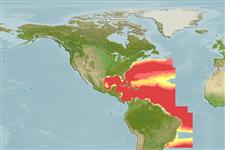Environment: milieu / climate zone / depth range / distribution range
экология
морской; мигрирует в океане (Ref. 51243); пределы глубины 0 - 50 m. Tropical; 20°C - ? (Ref. 168); 43°N - 28°S, 100°W - 26°W (Ref. 55290)
Western Atlantic: off Martha's Vineyard, Massachusetts south to Trinidad Island and Rio de Janeiro, Brazil (Ref. 168); including south of Brazil (Ref. 36453). Highly migratory.
Length at first maturity / Size / Вес / Возраст
Maturity: Lm 49.4 range ? - ? cm
Max length : 108 cm FL самец/пол неопределен; (Ref. 40637); common length : 72.0 cm FL самец/пол неопределен; (Ref. 168); наибольший вес (опубликованные данные): 20.6 kg (Ref. 40637)
колючие лучи спинного плавника (общее число) : 13; членистые (мягкие) лучи спинного плавника (общее число) : 14 - 15; колючие лучи анального плавника: 0; членистые (мягкие) лучи анального плавника: 13 - 14; позвонки: 39.
Found in oceanic waters, sometimes not far from the coast (Ref. 13628). Forms large mixed schools with the skipjack tuna. Its spawning grounds are located well offshore. Preys on surface and deep-sea fishes, squids, amphipods, shrimps, crabs and stomatopods and decapod larvae. The largest fishery for blackfin tuna operates off the southeastern coast of Cuba and uses live-bait and pole. Utilized fresh, dried or salted, canned and frozen (Ref. 9987).
Life cycle and mating behavior
Maturities | размножение | Spawnings | Egg(s) | Fecundities | личинки
Collette, B.B. and C.E. Nauen, 1983. FAO Species Catalogue. Vol. 2. Scombrids of the world. An annotated and illustrated catalogue of tunas, mackerels, bonitos and related species known to date. Rome: FAO. FAO Fish. Synop. 125(2):137 p. (Ref. 168)
Статус Красного Списка МСОП (Ref. 130435)
Угроза для людей
Harmless
Использование человеком
рыболовство: коммерческий; объект спортивного рыболовства: да
дополнительная информация
инструменты
Специальные отчеты
Скачать в формате XML
ресурсы в Интернет
Estimates based on models
Preferred temperature (Ref.
123201): 10 - 20.5, mean 14.4 °C (based on 163 cells).
Phylogenetic diversity index (Ref.
82804): PD
50 = 0.5039 [Uniqueness, from 0.5 = low to 2.0 = high].
Bayesian length-weight: a=0.01148 (0.00699 - 0.01886), b=3.05 (2.91 - 3.19), in cm total length, based on LWR estimates for this species & Genus-body shape (Ref.
93245).
Trophic level (Ref.
69278): 4.4 ±0.3 se; based on diet studies.
устойчивость к внешним воздействиям (Ref.
120179): средний (среднего размера), минимальное время удвоения популяции 1.4-4.4 года (K=0.22; tm=3; tmax=5).
Prior r = 0.77, 95% CL = 0.51 - 1.16, Based on 1 data-limited stock assessment.
Fishing Vulnerability (Ref.
59153): Moderate vulnerability (42 of 100).
Climate Vulnerability (Ref.
125649): High to very high vulnerability (75 of 100).
Nutrients (Ref.
124155): Calcium = 48.4 [26.7, 111.0] mg/100g; Iron = 2.86 [1.11, 6.97] mg/100g; Protein = 22.9 [21.4, 24.3] %; Omega3 = 0.31 [0.19, 0.52] g/100g; Selenium = 84.5 [27.1, 268.2] μg/100g; VitaminA = 69.2 [9.8, 534.2] μg/100g; Zinc = 0.59 [0.31, 1.14] mg/100g (wet weight);
